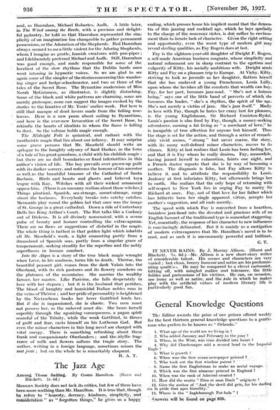The Jazz Age
MODERN Society does not lack its critics, but few of them have.
• been more scathing than Mr. Hamilton. It is true that, though refers to " honesty, decency, kindnesa,. simplicity, and Consideration " as " forgotten things," he gives us a` happy ending, which presses home his implicit moral that the demen. tia of this jazzing and cocktail age, which he lays spedially to. the charge of the tiouveaut.4ches, is Wel rather to environ- ment thait to innate lack of Character. Given the right setting and opportunity, even the worst type of modern girl may
reveal sterling qualities, as Fay Rogers does at last. •
Fay is the eighteen-year-old daughter of Dwight F. Rogers, a self-made American business magnate, whose simplicity and . natural refinement are in sharp contrast to the egotism' and vulgarity of Kitty, his socially ambitious wife. Dwight sends Kitty and Fay on a pleasure.trip to Europe, At Vichy, Kitty, striving to look as juvenile as her daughter, flatters herself that she has enslaved -a young Frenchman, Louis Lilly, upon.whom she lavishes all the comforts that' wealth can buy. Fay, for her part, becomes jazz-mad. " She's not a human being," says one of the little band of perverts of which: she becomes the. -leader, ". she's a rhythm, the spirit of the -age. She's not merely a victim of jazz. She's jazz itself." Madly in love with Fay, though he hates her crazy lust for pleasure, is the young Englishman, Sir Richard Coniston-Rydal. Louis's passion is also fired by Fay, though, a money-seeking adventurer, earning a fat living as "a merchant of love," he is incapable of true affection for anyone, but himself. Thus the stage is set for the action, and through a series of remark- ably vivid scenes, " strong " but never coarse, the story, with its many well-defined minor characters, moves to its climax. Kitty at last realizes that Louis has been foolingher, and that it is Fay whom he really. desires. Fay, meanwhile, having jazzed herself to exhaustion, faints one night, „and a French doctor reporti -that she is by way of becoming a mother. The diagnosis is false, but Fay allows Kitty to believe it and -to. attribute the - responsibility to Lonis. Jealousy at first infuriates Kitty, but afterwards brings her to earth. She realizes that the only hope of returning with self-respect to New York lies in urging Fay to marry Sir Richard at once. Fay, out of that love for her father which has hithertO been her single apparent virtue, accepts her mother's suggestion, and all ends merrily.
The speed with which Fay is converted from a heartless, brainlessjazz-fiend into the devoted and -gracious wife of an English baronet of the traditional type is somewhat staggering. Yet, essentially, the response of her character to-new-influences is convincingly delineated. But it is mainly as a castigation of modern extravagances, that Mr. Hamilton's novel is to be read, and as such it is uncommonly powerful and brilliant.
G. T.






















































 Previous page
Previous page